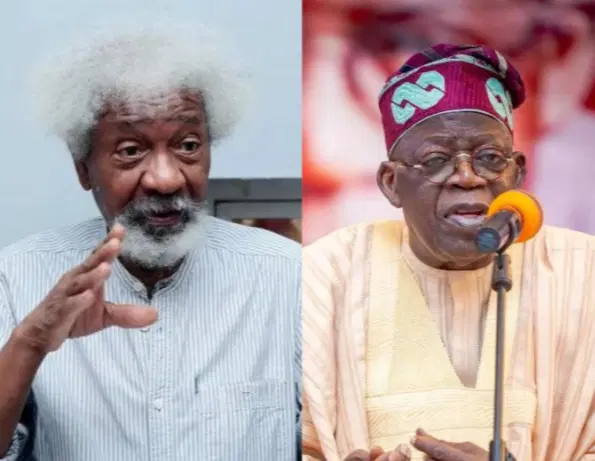In recent times, Nigeria has been a focal point of civil unrest and public demonstrations, largely sparked by the populace’s discontent with widespread issues such as police brutality, corruption, and governance failures.
Amidst this backdrop, the speech by Bola Tinubu, a prominent Nigerian political figure, has come under fire for its perceived failure to address the critical issue of police brutality. Renowned playwright and social commentator, Wole Soyinka, has been particularly vocal in his criticism, asserting that Tinubu’s address glossed over the pressing concerns of police violence against peaceful protesters. This critique underscores the broader societal frustration and the urgent need for accountability and reform within Nigeria’s law enforcement agencies.
The Context of the Protests
The protests in Nigeria, particularly the #EndSARS movement, have brought international attention to the systemic issues within the Nigerian Police Force, specifically the Special Anti-Robbery Squad (SARS). Reports of extrajudicial killings, harassment, and widespread abuse of power by SARS officers have been rampant, leading to a nationwide outcry. The protests have been marked by large gatherings of citizens demanding justice, transparency, and significant police reforms.
Despite the government’s disbanding of SARS, the protests have continued, fueled by a deep mistrust of governmental promises and the absence of tangible change on the ground. In this volatile environment, political leaders’ speeches and actions are scrutinized for their sincerity and commitment to addressing the root causes of public discontent.
Tinubu’s Speech: A Missed Opportunity
Bola Tinubu’s speech, intended to address the nation during these tumultuous times, was expected to provide reassurance, empathy, and a concrete plan for addressing the issues at hand. However, according to Wole Soyinka and many others, the speech fell short of these expectations. Tinubu, a former governor of Lagos State and a significant figure in Nigerian politics, chose to focus on the broader implications of the protests, such as their impact on national stability and economic activities, rather than directly addressing the core issue of police brutality.
Soyinka’s critique highlights a critical gap in Tinubu’s approach. By failing to acknowledge and condemn the specific instances of police violence that sparked the protests, Tinubu’s speech was seen as evasive and disconnected from the immediate concerns of the citizens. This omission not only alienated many protesters but also cast doubt on the government’s willingness to implement genuine reforms.
Wole Soyinka’s Stance on Police Brutality
Wole Soyinka, a Nobel Laureate and an enduring voice of conscience in Nigeria, has consistently advocated for human rights and justice. His criticism of Tinubu’s speech is rooted in a broader advocacy for the protection of civil liberties and the rule of law. Soyinka’s stance is that any address to the nation in the context of these protests must unequivocally denounce police brutality and offer a clear pathway to reform.
Soyinka’s commentary resonates with a significant portion of the Nigerian populace who feel that their voices are often ignored or suppressed by those in power. His call for accountability is not merely about addressing past wrongs but ensuring that future generations can trust in the justice system and feel safe in expressing their views without fear of retribution.
The Importance of Addressing Police Brutality
Addressing police brutality is not just a matter of public relations; it is a fundamental aspect of governance that impacts societal trust and cohesion. When citizens perceive that law enforcement operates above the law, it erodes their confidence in the state and its institutions. This erosion of trust can lead to increased civil unrest, social fragmentation, and a cycle of violence that undermines national stability.
READ ALSO:#EndBadGovernance: Hoodlums Strike Katsina Churches, Loot Millions in Valuables
For political leaders, acknowledging and addressing police brutality is crucial in rebuilding this trust. It involves not only condemning wrongful actions but also implementing comprehensive reforms to ensure accountability, transparency, and justice within the police force. This includes setting up independent oversight bodies, conducting thorough investigations into allegations of abuse, and holding perpetrators accountable.
The Role of Political Leaders in Times of Crisis
In times of crisis, the role of political leaders is to provide clarity, direction, and hope. Their words and actions can either exacerbate tensions or help to calm them. Tinubu’s speech, in the view of Soyinka and many others, missed a crucial opportunity to do the latter. By not directly addressing the core grievances of the protesters, Tinubu’s speech risked appearing tone-deaf and out of touch with the realities on the ground.
Effective leadership requires a deep understanding of the issues at hand and a willingness to engage with them honestly and openly. It also requires a commitment to making difficult decisions and implementing changes that may challenge the status quo but are necessary for the greater good.
Moving Forward: The Need for Genuine Reform
The criticism of Tinubu’s speech is a reflection of a broader demand for genuine reform within Nigeria. The protests have highlighted deep-seated issues that require more than just rhetorical acknowledgment; they need actionable solutions. This includes overhauling the police force, addressing systemic corruption, and ensuring that human rights are protected.
For reforms to be effective, they must be inclusive and involve input from a wide range of stakeholders, including civil society organizations, human rights advocates, and the communities most affected by police violence. Transparency in the reform process is also essential to build trust and ensure that changes are not just superficial but lead to substantive improvements.
Also,
The critique by Wole Soyinka of Bola Tinubu’s speech underscores a critical moment in Nigeria’s ongoing struggle for justice and accountability. It highlights the urgent need for political leaders to address the root causes of public discontent and to commit to meaningful reforms. Police brutality is a significant issue that cannot be ignored, and addressing it is essential for restoring public trust and ensuring long-term stability.
As Nigeria continues to navigate this challenging period, the voices of those like Soyinka serve as a reminder of the importance of integrity, empathy, and action in leadership. The path forward requires a collective effort to build a society where justice and human rights are upheld, and where every citizen can feel safe and respected.






























































